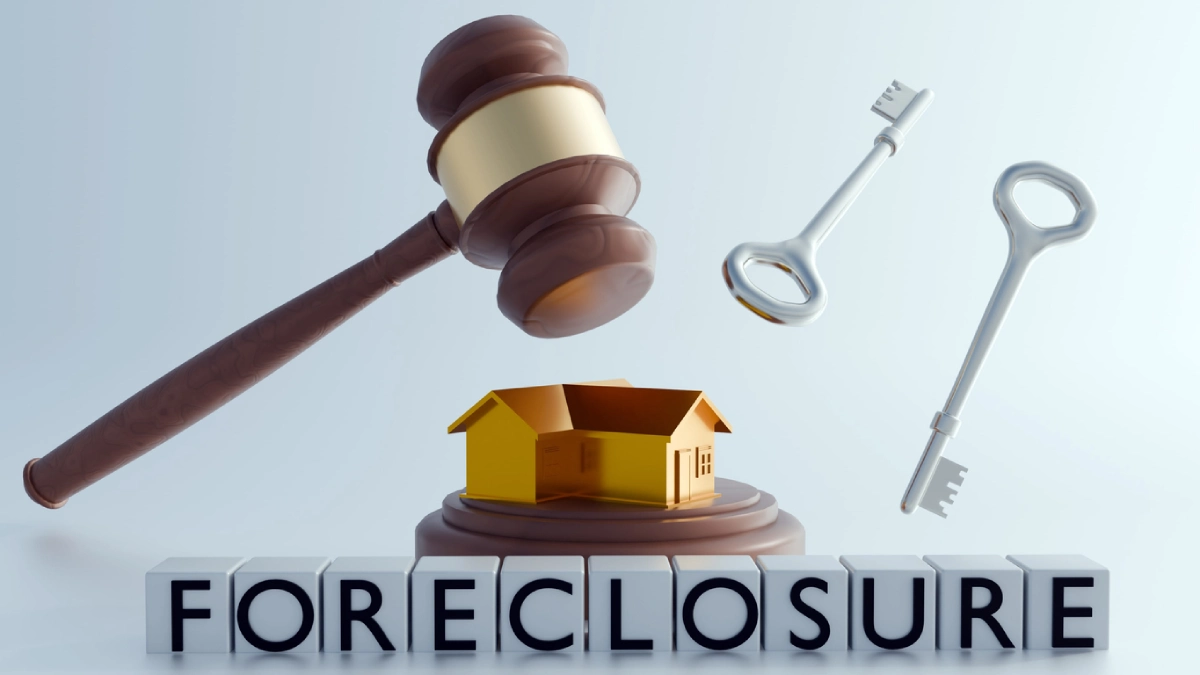
Estavillo Law takes pride in helping clients through commercial real estate foreclosures. Commercial foreclosure cases can jeopardize substantial investments. The stakes are high. They demand careful attention and accuracy. And we believe we shine in those arenas.
Commercial foreclosures often involve substantial financial sums, intricate legal processes, and multiple parties. These parties can include lenders, borrowers, and tenants.
We approach these situations with a strategy that minimizes risks and maximizes benefits. If you are facing commercial foreclosure, contact Estavillo Law for a free consultation. We will guide you in protecting your investments and securing a favorable resolution.
Understanding the Foreclosure Process
The foreclosure process for commercial real estate varies by state law and jurisdiction. It involves steps that help lenders recover their investments. It also gives borrowers time to fix their financial issues. It usually starts when a borrower defaults on loan payments. Then, the lender takes legal action.
In California, this is followed by the lender filing a notice of default. Then the lender uses a notice of sale.
When a borrower receives a notice of default, they enter the pre-foreclosure phase. This phase lasts a time period of one to four months, depending on local laws and mortgage terms.
During this period, the homeowner can repay the missed payments, sell the property to recover losses, or contest the pre-foreclosure notice. If repayment or a successful appeal does not resolve the default, the property moves to foreclosure.
At this stage, the bank sells the property at a public auction. If it does not sell there, the lender may take ownership. They will then sell it via a real estate agent or a property listing.
All parties must understand the process for handling a foreclosed commercial property. Missteps can lead to unnecessary losses.
Types of Commercial Property Foreclosures
Commercial property foreclosures differ. Each type needs a specific approach to handle them effectively. There are two main types of foreclosures: judicial foreclosure and non-judicial. Each has its own procedures and implications.
Judicial foreclosures involve a formal process with court intervention. The lender must file a lawsuit against the borrower to reclaim the foreclosed property back. The judicial foreclosure process tends to be more time-consuming and costly due to its reliance on the legal system.
Judicial foreclosures are often necessary in states that require them. They protect borrowers by allowing them to contest the foreclosed commercial property in court.
Non-judicial foreclosures bypass the court system, enabling a quicker resolution. This is possible if the mortgage has a power of sale clause. It grants the lender the right to foreclose and sell the property if there is a default.
Non-judicial foreclosures are cheaper. They are preferred in states that allow them. They are faster. The non-judicial foreclosure process skips the lengthy court procedure. This allows properties to be reclaimed and resold swiftly.
Knowing which foreclosure type applies can affect decisions and risk assessments. It can also impact timeline management in distressed property cases. Knowing both types of foreclosures can boost confidence in the real estate market.
Finding and Buying Foreclosed Commercial Properties
Foreclosed properties typically sell below market value. A foreclosure sale offers potential high returns for savvy investors. You can find foreclosed commercial properties in several ways. Check online listings and real estate agents.
Purchasing a property through a foreclosure sale requires diligence. This includes thorough research on the property’s condition, title, and any existing liens. A thorough check of a property’s history, including property ownership and condition, can prevent future issues.
Engaging with a lawyer is advisable. Estavillo Law can help investors gain insights into foreclosed properties.
A lawyer can ensure due diligence is done efficiently and effectively. It helps commercial real estate investors to make informed decisions and reduce purchase risks.
Thorough preparation and expert guidance can lead to successful investments in foreclosed commercial properties. Trust Estavillo Law to guide you through your investment journey. Reach out today for a free consultation.
Preventing Commercial Property Foreclosure
Preventing foreclosure on a commercial property requires proactive measures and strategic planning. The property owner must prioritize maintaining clear and effective communication with their lenders. This helps address any concerns as they arise.
Early discussions about financial hardships may lead to restructuring options. Loan modifications can help. They can lower interest rates or extend payment terms.
Owners should regularly review financial statements and the market. It helps them spot cash flow issues. A contingency budget for unexpected costs provides a cushion in tough times.
Enhancing the property’s value through strategic improvements is beneficial. Attracting and retaining reliable tenants can increase revenue and contribute to financial stability.
Consulting with commercial property management professionals and legal advisors offers additional strategies. By taking these preventative steps, property owners mitigate the risk of foreclosure.
The Role of Mediation in Commercial Foreclosure Disputes
We understand the critical role mediation plays in resolving commercial foreclosure disputes. Mediation offers a flexible space for negotiation. They allow lenders, borrowers, and other parties to find solutions outside the court system.
As impartial mediators, we help clarify each party’s needs and interests. We facilitate their discussions. The aim is to achieve a mutually acceptable agreement.
Mediation can speed up disputes. It can cut costs and keep business ties that litigation may harm. It can lead to loan restructuring or partial debt settlements. These may not be possible through regular court proceedings.
The Role of a Receiver in Commercial Foreclosures
When a commercial property enters foreclosure, a court may appoint a receiver to manage it.
The receiver’s main job is to keep the former property owner’s finances healthy during the foreclosure. This involves overseeing daily operations and protecting the property’s value. In some cases, the receiver may also facilitate the sale of the property.
Borrowers must know the receiver’s duties. Their decisions can affect the property’s future. Lenders should also know the receiver’s role. It can affect the foreclosure outcome.
Proper management by the receiver can help ensure that the property’s value is preserved. This can lead to a more favorable resolution for all parties involved in the foreclosure process.
The receiver acts as a neutral overseer. It means balancing the borrower’s and lender’s interests. The goal is to stabilize the property’s finances.
Both parties should be familiar with how the receiver’s actions may affect the foreclosure. With careful management, the receiver can greatly improve the property’s prospects.
Tenants’ Rights Following a Commercial Foreclosure
Tenants in foreclosed commercial properties have specific, respected rights. These rights can vary by lease agreements and local laws.
They usually include tenants’ rights to stay in the property for a set period. New owners must honor existing leases unless they can legally evict the former owner or tenants.
Tenants in foreclosed commercial properties must protect their rights. It is crucial to take the correct steps to do so. Estavillo Law is here to help you choose the best strategy. Contact us today to safeguard your finances.
Defenses and Options for Borrowers
Borrowers facing foreclosure have various defenses and options. They may consider negotiating with their lenders for loan modifications. This could make their payments more manageable and help them keep their property.
Another option is to challenge the foreclosure in court. This legal route can be complex. It may involve disputing the lender’s right to foreclose under the loan agreement. It may also involve highlighting errors in the foreclosure process.
Borrowers might explore the possibility of filing for bankruptcy. Though seen as a last resort, bankruptcy can help. It can halt foreclosure and provide the borrower with a plan to manage debts.
Each of these options carries its own set of implications and must be considered with great care. The choice of defense or strategy depends on the borrower’s situation. This includes their finances, the mortgage terms, and their foreclosure status. Borrowers must evaluate these options before deciding on the best action.
A commercial real estate foreclosure lawyer can help during this tough time. We can offer insight in identifying potential defenses against foreclosure. This can greatly affect the foreclosure process. It may let borrowers keep their property or reach a better outcome.
Legal Pitfalls in Commercial Foreclosure
Commercial foreclosure proceedings pose many legal challenges. Borrowers and lenders must navigate them with care. A significant risk exists in the ambiguity or complexity of loan agreements. These agreements may contain clauses that complicate the foreclosure process. Misinterpretations can lead to prolonged disputes or costly litigation.
Failure to adhere to specific procedural requirements can undermine a foreclosure case’s credibility. Improper notice or failure to follow foreclosure laws may delay or dismiss cases.
Fraud is another concern for borrowers and lenders. Fraudulent documents or misrepresentations can disrupt the process, leading to potential legal liabilities. Both parties should thoroughly protect their interests.
Commercial real estate lawyers can ensure compliance with procedures. We also clarify contracts and protect against risks. This guidance helps resolve foreclosure matters more effectively.
Working with a California Commercial Real Estate Foreclosure Lawyer
A California foreclosure lawyer helps borrowers, lenders, and tenants in commercial foreclosures. We have experience with state-specific regulations and intricate legal procedures. This knowledge helps us advocate for our clients in California real estate cases.
For borrowers, a lawyer assists in exploring viable options. These options include loan modifications or defenses against foreclosure actions.
Lenders need legal advice on their foreclosure processes. This helps them meet legal standards and protect their financial interests.
Tenants rely on these lawyers to protect their lease rights. This helps prevent unwarranted evictions during the foreclosure transition.
A commercial real estate lawyer can provide help for all parties. This leads to smoother proceedings and better outcomes. These outcomes can include retaining property, concluding sales, and maintaining leases.
Estavillo Law: Your Commercial Real Estate Foreclosure Lawyer
The right attorney can mean the difference between losing property and winning your case. Estavillo Law helps clients negotiate with lenders to find viable solutions. Our legal team fights for the rights of borrowers.
We can provide a strategic advantage in managing risks and safeguarding investments.
If you are facing foreclosure in California, Estavillo Law can help. We can assist in securing your financial future. Contact us today to schedule a free consultation and explore your options.


